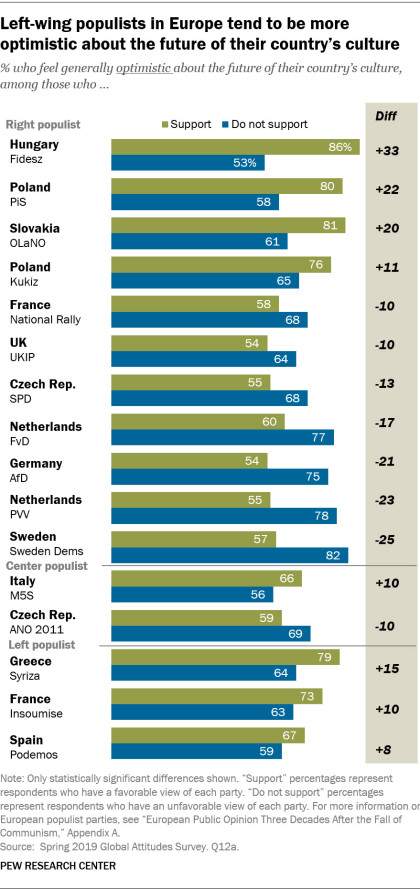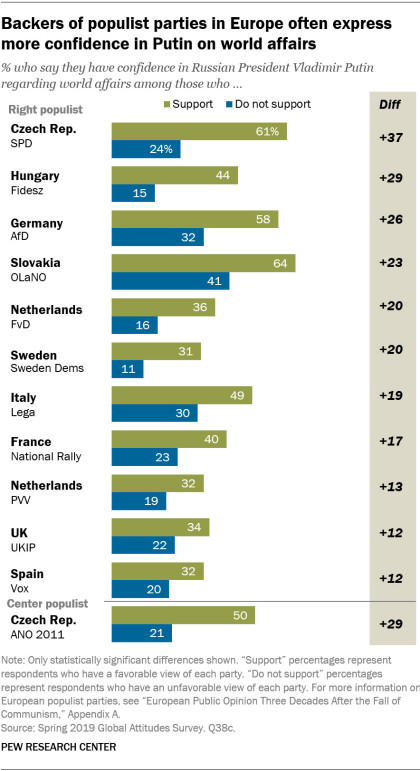
Europe’s populist revolt is realigning the continent’s politics around new fault lines: City versus countryside, working class versus highly educated elites, “sovereignists” versus “globalists.” This has come at the expense of the center-left and center-right parties that have long dominated politics but now scramble to stop hemorrhaging voters to upstart populist parties, PPI’s Will Marshall observes.
Whose vision will prevail in Europe: that of liberal democrat French President Emmanuel Macron or Hungary’s illiberal populist Viktor Orban? he asks in the Hill:
 Progressive forces in Europe are demoralized, and the nationalists clearly have momentum. If this trend continues, Europe could find itself backsliding toward historical ethnic and cultural antagonisms that bred the kind of conflicts we last saw during the breakup of Yugoslavia. That in turn could erode economic trust and cooperation across the common market and undermine the whole edifice of transnational institutions that have upheld liberal values and made modern Europe more than a fractious collection of mid-sized to small countries.
Progressive forces in Europe are demoralized, and the nationalists clearly have momentum. If this trend continues, Europe could find itself backsliding toward historical ethnic and cultural antagonisms that bred the kind of conflicts we last saw during the breakup of Yugoslavia. That in turn could erode economic trust and cooperation across the common market and undermine the whole edifice of transnational institutions that have upheld liberal values and made modern Europe more than a fractious collection of mid-sized to small countries.
An open, free and prosperous Europe is one of America’s great foreign policy achievements and strategic assets. Most Americans don’t want to go it alone in the world, adds Marshall, president and founder of the Progressive Policy Institute (PPI), and a former National Endowment for Democracy board member.
Europe’s political environment has been rocked in recent years by the emergence of populist parties, many of which sit on the far right of the political spectrum and question the fundamental value of European integration, the Pew Center’s Kat Devlin and Mara Mordecaiobserve. These parties generally receive relatively low favorability marks in national surveys, but their supporters stand out on a range of important issues. judging by the Pew Research Center’s 2019 Global Attitudes Survey.

National Endowment for Democracy
People with positive views of populist parties in Europe tend to have a much less favorable attitude toward the European Union, they add, while populist party supporters tend to have more confidence in Russian President Vladimir Putin’s dealings in international affairs.
But supporters of populist parties in Europe vary when it comes to their assessments of the future of their country’s culture, they note. Backers of the three left-wing populist parties in the Center’s survey are all more optimistic about the future of their country’s culture when compared with nonsupporters. But there is less consensus among supporters of right-wing and center-populist parties.
Promising efforts by social movements
Since the 2008 financial crisis, European democracies have lurched decisively in a damaging direction. Democratic citizens have found themselves with less and less of a say in how their societies are being run, all while more and more severe measures have been enacted in their name, writes University College London’s Benjamin Abrams. What hope is there for societies undergoing such democratic downgrades? he asks.
 When pro-democratic parties and institutions have dutifully refrained from acting until they encounter the formal opportunity presented by an election or referendum, they invariably lose a battle pitched on their opponents’ terms. By contrast, much more fruitful outcomes have arisen from the activities of grassroots organisations and civil society coalitions which have refused to adhere to the formality demanded by democratic downgraders, he writes for the LSE’s EUROPP blog.
When pro-democratic parties and institutions have dutifully refrained from acting until they encounter the formal opportunity presented by an election or referendum, they invariably lose a battle pitched on their opponents’ terms. By contrast, much more fruitful outcomes have arisen from the activities of grassroots organisations and civil society coalitions which have refused to adhere to the formality demanded by democratic downgraders, he writes for the LSE’s EUROPP blog.
He cites promising efforts by social movements making representations to power holders, and democratic resistance movements reasserting citizens’ substantive rights or undermining leaders’ domestic agendas. From the anti-corruption movement in Romania to the ‘anti-coup’ protests in the United Kingdom and the anti ‘slave law’ protests in Hungary, the enduring lesson for European democrats is simple: substantive democracy requires substantive defense.







